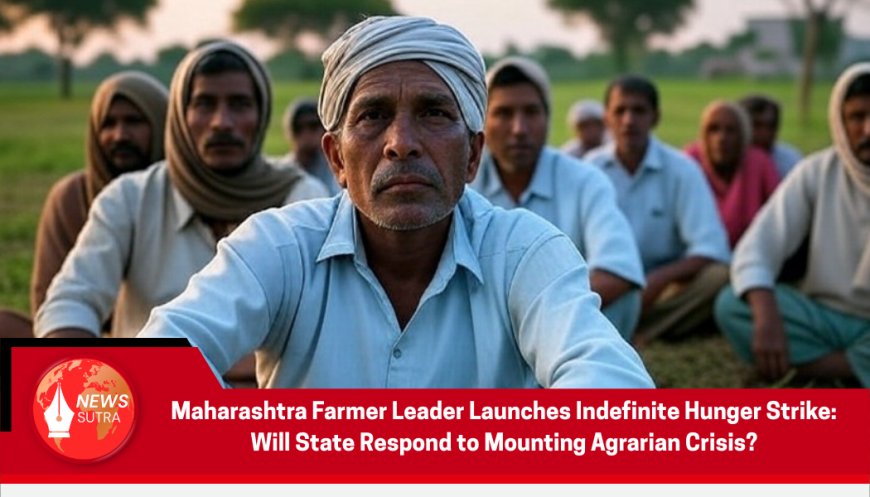Maharashtra Farmer Leader Launches Indefinite Hunger Strike: Will State Respond to Mounting Agrarian Crisis?
Maharashtra farmer leader Raju Shetti has launched an indefinite hunger strike demanding legal MSP, loan waivers, and crop insurance reforms. Will the state government respond in time?

By Ronald Kapper | June 13, 2025
MUMBAI — In a bold escalation of farmer-led activism in Maharashtra, veteran leader Raju Shetti, chief of the Swabhimani Shetkari Sanghatana (SSS), has begun an indefinite hunger strike in Kolhapur, demanding urgent action on long-pending agrarian issues plaguing the state’s rural heartland. The protest, launched on June 12, has already drawn attention from opposition parties, farmers' unions across India, and rights groups advocating for equitable agricultural reforms.
With summer temperatures peaking and the kharif sowing season approaching, the timing of the hunger strike has added pressure on the Eknath Shinde-led Maharashtra government, which is already grappling with pre-election volatility and rural unrest.
The Core Demands: MSP, Loan Waivers, and Crop Insurance Reform
Raju Shetti, a two-time Member of Parliament and one of Maharashtra’s most vocal farmer advocates, has listed a five-point charter of demands. The centerpiece is a legal guarantee for Minimum Support Price (MSP) in line with the recommendations of the Swaminathan Commission—a long-standing demand that gained national momentum during the 2020–21 farmers' protests in Delhi.
Other key demands include:
-
Immediate waiver of outstanding farm loans, especially for small and marginal farmers
-
Reforms to the Pradhan Mantri Fasal Bima Yojana (PMFBY) to ensure transparency and faster claim settlements
-
Compensation for recent unseasonal rains and hailstorm damage in Vidarbha and Marathwada
-
Restoration of fair procurement prices and direct market access via APMC reforms
These issues are chronic, but the urgency has been renewed by recent reports from the Centre for Monitoring Indian Economy (CMIE), which show rising indebtedness and declining real incomes among rural agricultural households in Maharashtra.
Political Ripples Across the State
Though the hunger strike began as a grassroots action, its political reverberations have been swift. Senior leaders from the Congress, NCP (Sharad Pawar faction), and Shiv Sena (UBT) have visited Shetti at the protest site, offering symbolic support and demanding immediate talks with the Chief Minister.
Meanwhile, the ruling Shiv Sena-BJP alliance has maintained a cautious stance. Agriculture Minister Dada Bhuse told reporters on Wednesday that the government is “open to dialogue but won’t act under pressure.” However, senior bureaucrats from the Department of Agriculture, Maharashtra have been dispatched to assess the demands formally.
Commenting on the strike, rural policy expert Dr. Sudha Narayanan from Indira Gandhi Institute of Development Research (IGIDR) said, “This isn’t just about Maharashtra. It reflects the deeper fault lines in India’s agrarian policy—where quick fixes often overshadow structural reform.”
A Grim Pattern: Maharashtra’s Farmer Suicides Still a Concern
The hunger strike also brings renewed focus to the state’s alarming rate of farmer suicides. According to the National Crime Records Bureau (NCRB), Maharashtra recorded over 4,000 farmer suicides in 2023, the highest in the country. Most victims were debt-ridden and lacked access to institutional credit or crop insurance compensation.
Raju Shetti has repeatedly stated that “farmer deaths are not statistics—they are failures of governance.” His organization has published field reports, corroborated by NGOs like Down to Earth, documenting widespread grievances over compensation delays and crop assessment corruption.
A Broader National Context
The hunger strike coincides with renewed calls for nationwide farmer mobilizations ahead of the 2026 general elections. Groups such as the Samyukt Kisan Morcha (SKM) are already planning rallies and policy submissions to Parliament. Shetti’s protest is seen as a template for state-level escalation.
A joint statement by several farmer organizations, including the Bharatiya Kisan Union (BKU) and AIKS, emphasized solidarity with the Maharashtra agitation. “Raju Shetti’s demands echo across states. Punjab, UP, Tamil Nadu—everywhere farmers are asking the same thing: fair prices, debt relief, and dignity,” the statement read.
Government Response: Will It Come in Time?
As the hunger strike enters its second day, pressure is mounting on the Maharashtra government to respond before Shetti’s health deteriorates or rural anger turns into wider protest. With over 60% of the state’s population dependent on agriculture, any unrest in this sector could severely dent the government’s rural image.
Activists have warned of statewide bandh calls if negotiations are not initiated soon. Local farmers in Kolhapur, Sangli, and Ahmednagar have already begun mobilizing support rallies. The issue is also trending across platforms, with major news portals such as The Wire, Scroll, and LiveLaw providing ground-level coverage and legal analysis.
Conclusion
Whether this hunger strike results in meaningful policy intervention or becomes another symbolic act in the long list of agrarian protests remains to be seen. What is certain, however, is that Maharashtra’s farmers are no longer willing to wait in silence.
With elections approaching and rural patience wearing thin, the Shetti-led agitation may become a defining moment in shaping the state’s—and possibly the nation’s—agrarian discourse.














